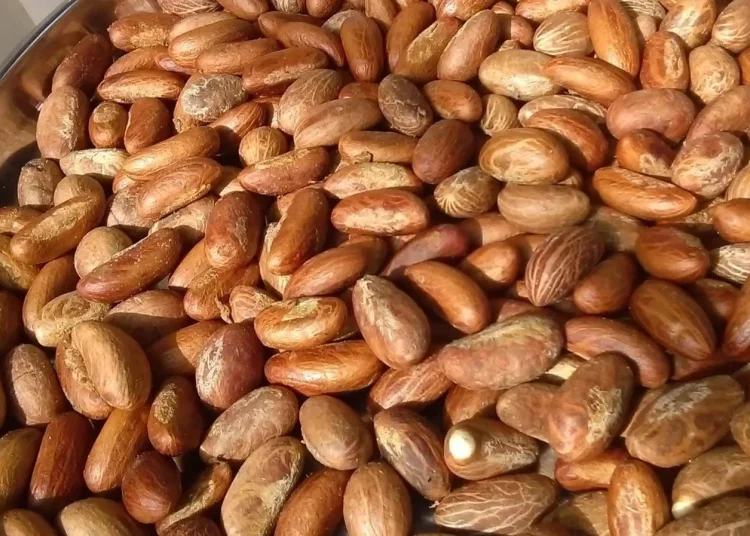Bitter kola also known as Garcinia kola (G Kola) is a species of flowering plant in the Clusiaceae or Guttiferae family. Bitter Kola demands a lot of patience from the farmer because it takes a minimum of 7-10 years before harvesting while 4-5 years with access to enhanced and modern farming. Due to this factor, there are shortages of farmers getting more involved in it compared to the high brid kola nut (yellow/red) which is ready for harvest between 3-4 years. A farmer would certainly be making a lot of fortune investing in this type of high-end lucrative farming as bitter Kola is widely sought after in the international market due to its various health benefits while it is also heavily consumed in the local market with cultural values attached to this plant.
It is found in Nigeria in States like; Ondo, Niger Enugu, Osun, Oyo, Imo, and Ogun States. Bitter kola Farming is flourishing in countries such as; Cameroon, Ghana, Benin, Gabon, Liberia, Senegal, Sierra Leone and the Democratic Republic of the Congo, Brazil, and parts of the Caribbean as well. The seedling can be sourced from the fruits market or from specialised farmers willing to give them out at a little cost. The prices vary between N1,800 to N2,000 for nursery bags plants; N2,000-N3,000 for a small sachet or nylon bitter Kola pack, while a rubber paint goes for between N26,000-N30,000; even as 50kg bag goes for N190,000 -N300,000, depending on the market. From findings, the plant can grow up between 30-60 metres in height.
Land cultivation
After cutting the grass and trees where it would be planted, tilling of the soil comes next while the most suitable soil for planting should be sandy loam or clay-loam rich in organic matter. PH of 5.0 (neutral) – 6.5 (alkaline) is ideal for bitter kola farming which is similar to walnut farming as well. For better growth, Bitter Kola grows well in wet soil when planted in a natural habitat and placed under the shade for 3 years before being transplanted. It is advised that the seeds should be sown quickly after harvest because it has a short viability period. The germination of fresh seed is about 50 per cent after 3 months of planting. From 7-8 months, it is expected that the seeds would have germinated. But nursery seeds continue to germinate till 18 months with about a 75% germination rate. The germination of the seed is seen as a major challenge and increases germination to about 80 or 90%, ethanol solution (alcohol) can be deployed to soak the seeds for 1-2 hours before planting. Spacing is 10m×10m or 12m×12m.
Weeding
Weeding can be done manually or through the use of herbicides every 3 months in the first 4 years. The effect of weed on the plant will cause stunt growth, pest, and disease damage. So, farmers are encouraged to weed the plants often.
Application of fertilizer Fertilizer can be used on the land to help boost plants just as it is done on the most plant. For deficient soil, fertilizer should be used to increase the nutrient and the plantation fertilized every six months.
Pest control
To control pests and insect attacks on the bitter Kola pods, pesticides can be used on it while harvesting on time helps curb this effect.
Harvesting
The fruits turn yellow or orange when ripe and mature for harvest. The harvesting can be done by plucking the pods or allowing them to fall, burst, and spills their contents on the soil on their own. Mostly the fruit In some cases, Grafted or transplanted bitter kola can fruit at 10-12m height depending on the soil. After the first harvest year, Bitter kola is available from the April-October for harvest every year.





